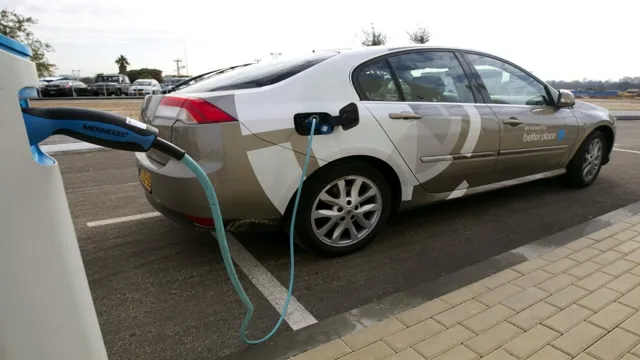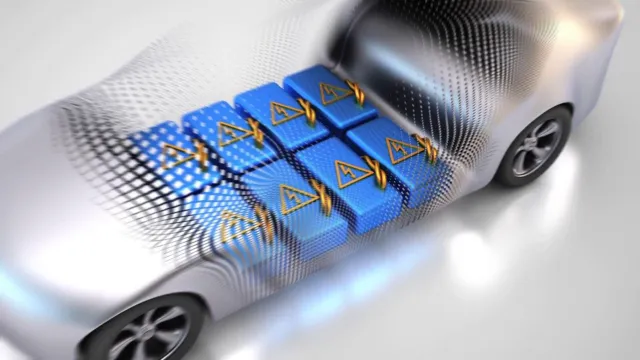The True Costs of Going Green: Examining the Environmental Impact of Lithium Batteries in Electric Cars
Electric cars have become increasingly popular in recent years, as people look for more sustainable and environmentally friendly ways to get around. One of the key components that make electric cars possible is the lithium battery. This type of battery can help reduce emissions compared to gasoline-powered cars, but it’s not without its external costs.
Understanding the impact of these side effects is essential for individuals, businesses, and policymakers looking to make informed decisions about the future of transportation. In this blog post, we’ll explore what lithium battery external costs are, how they affect the environment and communities, and what can be done to mitigate them. So, buckle up and let’s dive into the world of electric cars and lithium batteries!
Benefits of Electric Cars
Electric cars are commonly advertised as a more sustainable and environmentally friendly alternative to gasoline-powered vehicles. However, a debate has arisen about whether the manufacturing and disposal of lithium batteries, which provide the energy for these vehicles, result in external costs that outweigh the benefits of reduced emissions. Research has shown that while producing lithium batteries does have environmental impacts, the overall cradle-to-grave environmental impact of electric cars is still significantly lower than that of gasoline cars.
Additionally, the technology for producing and disposing of lithium batteries is rapidly improving, which means that the environmental impacts of these batteries will likely continue to decrease over time. Ultimately, electric cars remain a promising solution to reducing carbon emissions and improving air quality, even as manufacturers work to make the battery production process even greener.
Lower Emissions & Air Pollution
Electric cars have numerous benefits, including lower emissions and cleaner air. By relying on electricity instead of fossil fuels, electric cars do not produce tailpipe emissions that contribute to air pollution and climate change. This means that they have a much smaller carbon footprint compared to traditional gas-powered cars.
Additionally, electric cars are not only better for the environment, but they can also be more affordable to operate over time. They have lower maintenance costs and require less frequent trips to the gas station, saving money on fuel expenses. While some people may be hesitant to make the switch to electric cars due to concerns about range, technology is rapidly improving and many electric cars can now go hundreds of miles on a single charge.
Overall, the benefits of electric cars cannot be overstated when considering the health of our planet and our wallets.

Reduced Fossil Fuel Dependence
Electric cars offer many benefits that can help reduce fossil fuel dependence and combat climate change. One major advantage is that they emit far less greenhouse gases, making them a more environmentally friendly choice compared to traditional gas-guzzling cars. By switching to an electric car, drivers can help reduce their carbon footprint and contribute to a cleaner, sustainable future.
Additionally, electric cars can help reduce our reliance on foreign oil. Rather than relying on oil imports from volatile regions of the world, electric cars can be powered by domestically produced electricity, which can be generated through a variety of renewable sources such as wind and solar. This can help improve energy security and reduce the risk of oil price spikes.
Not to mention, electric cars can also be more cost-effective in the long run, as they require less maintenance and have lower fuel costs compared to gasoline vehicles. All in all, the benefits of electric cars are numerous and make a compelling case for their adoption as a smart and sustainable transportation option.
Lithium Battery External Costs
When it comes to electric cars, one of the biggest debates is whether or not they are truly green. While electric vehicles produce no emissions on the road, the external costs of the Lithium batteries used to power them are often overlooked. There are numerous hidden costs to producing, transporting, and disposing of these batteries, which can range from environmental degradation to labor disputes.
This means that the true cost of electric vehicles is often higher than what consumers pay upfront. However, it’s important to note that these costs aren’t unique to electric cars. In fact, all forms of transportation come with external costs that can harm the environment and put human rights at risk.
Therefore, it’s up to us to make smart choices that reduce our impact on the world around us, whether that’s by choosing an electric car, a bike, or even just walking.
Environmental Effects of Lithium Mining
As the demand for electric vehicles and renewable energy storage increases, so does the demand for lithium, a crucial component in the batteries that power these technologies. However, the environmental effects of lithium mining are often overlooked. The external costs of extracting and processing lithium are significant, including air and water pollution, landscape destruction, and negative impacts on local ecosystems and communities.
While lithium may seem like a “clean” resource compared to fossil fuels, it is important to consider the full lifecycle of these batteries and the environmental tradeoffs involved. As we strive towards a sustainable future, we must continually weigh the benefits and costs of our energy sources and work towards minimizing their harmful impacts.
Disposal & Recycling Challenges
Lithium batteries have become a popular choice for powering various electronic devices, from smartphones to cars. However, with their extended lifespan and high energy capacity, these batteries also pose significant disposal and recycling challenges. The external costs of lithium batteries are not always evident, and they can be substantial.
Improper disposal of used batteries can cause environmental harm and damage to human health, resulting in significant clean-up costs. Recycling these batteries is also challenging because of the complex nature of their chemistry, which requires specialized handling and treatment. As a result, many used batteries end up in landfills, where they release toxic materials into the environment.
These challenges highlight the need for better waste management policies, improved recycling technologies, and broader public education to reduce the harmful externalities caused by lithium batteries. To minimize these external costs, we need to take a holistic approach to the production and disposal of these batteries, ensuring that we tackle both the environmental and social impacts of this technology.
Limited Supply & Rising Costs
As the popularity of electric cars continues to grow, so do the concerns regarding the limited supply and rising costs of lithium-ion batteries. While these batteries are crucial to the operation of electric vehicles, the external costs associated with their production are often overlooked. For example, the extraction and transportation of lithium can have harmful effects on the environment and surrounding ecosystems.
Additionally, the surge in demand for these batteries has caused an increase in prices, making it difficult for manufacturers to keep up with production. One solution to these issues is the exploration and development of alternative battery technologies. By investing in research and development, we can work towards finding solutions that benefit both the environment and the economy.
Sustainability Solutions
As we strive towards a more sustainable future, electric cars have become one of the popular choices for eco-conscious individuals. However, the problem lies in the extraction and production of the lithium batteries that power these cars. While lithium batteries do not release emissions while driving, the mining and production of lithium have numerous environmental impacts.
The process involves extracting large amounts of water and energy, leading to soil contamination, water scarcity, and other long-term ecological damages. Furthermore, the carbon footprint of producing lithium batteries surpasses that of traditional fuel engines. Therefore, while electric cars seem to be environmentally friendly, the external cost of lithium batteries raises questions on their sustainability.
Though electric cars pose a feasible solution to reducing air pollution, we must also consider the environmental impacts of the production and disposal of lithium-ion batteries along with investing in sustainable lithium extraction technologies.
Improvements in Lithium Extraction & Recycling
Lithium extraction and recycling have been a major focus for sustainability solutions in recent years. With the increasing demand for lithium-ion batteries, the need for a more sustainable and efficient way to source and recycle lithium has become crucial. Fortunately, there have been significant improvements in lithium extraction and recycling, making it a more viable option for both environmental and economic reasons.
One such improvement is the use of advanced technologies to extract lithium, such as adsorption and membrane-based processes. These methods not only reduce the environmental impact but also increase the purity of the extracted lithium. On the other hand, recycling lithium from used batteries has also become more efficient, with the development of new recycling processes that help recover up to 95% of lithium from old batteries.
This not only conserves valuable resources but also reduces the amount of waste that ends up in landfills. These advancements in lithium extraction and recycling go a long way towards creating a more sustainable future for our planet.
Alternative Battery Development
As our world becomes more environmentally conscious, alternative battery development has emerged as a crucial solution for sustainable energy consumption. Traditional batteries that rely on finite resources, such as lithium, pose a potential threat to the environment. Therefore, researchers are exploring alternative materials, such as sodium-ion, zinc-air, and solid-state batteries, which can provide a safer and more cost-effective alternative.
For example, sodium-ion batteries use readily available materials and feature a higher energy density than lithium-ion batteries, making them an ideal alternative. Similarly, zinc-air batteries generate electricity through a chemical reaction between oxygen and zinc, producing no emissions or carbon footprint. Advancements in the development of solid-state batteries, which use a solid electrolyte instead of a liquid one, will also provide a safer and more durable solution for portable electronics and electric vehicles.
As we continue to rely more on technology and sustainable energy sources, alternative battery development will play a crucial role in achieving a more sustainable future for all.
Conclusion: Balancing Pros & Cons
After examining the environmental impact and external cost of lithium batteries in electric cars, the answer to the question of whether electric cars are truly “green” becomes a bit more complicated. While they certainly have the potential to be a greener alternative in terms of reducing carbon emissions and air pollution, the production and disposal of their essential lithium batteries poses a significant environmental challenge. Ultimately, the decision to invest in an electric car should involve weighing the potential benefits and drawbacks, and considering the overall impact on the planet.
As with most things, it’s all about balance – just like how we must strive to use our cleverness to balance our technological advancements with the well-being of our environment.”
FAQs
What are electric cars and how are they different from gasoline cars?
Electric cars are vehicles that run on electric motors and rechargeable batteries instead of gasoline engines. Compared to gasoline cars, they produce lower emissions and are generally more energy-efficient.
How do lithium batteries affect the environment and what is their external cost?
Lithium batteries used in electric cars have a significant impact on the environment, as lithium mining and production are energy-intensive processes that result in carbon emissions and other waste. The external cost of lithium batteries includes the environmental damage caused during the production and disposal of batteries.
Are electric cars truly “green” vehicles?
While electric cars produce fewer emissions than gasoline cars during operation, the production and disposal of batteries and the manufacturing process of electric cars themselves can still have negative environmental impacts. However, with advancements in sustainable manufacturing and responsible battery disposal, electric cars can be a more sustainable transportation option.
How can we reduce the external costs of lithium batteries in electric cars?
There are several ways to reduce the external costs of lithium batteries in electric cars, such as increasing the efficiency of battery production and recycling, promoting responsible disposal practices, and investing in sustainable mining methods. Additionally, transitioning to renewable energy sources for charging electric cars can drastically decrease carbon emissions and mitigate environmental impacts.





